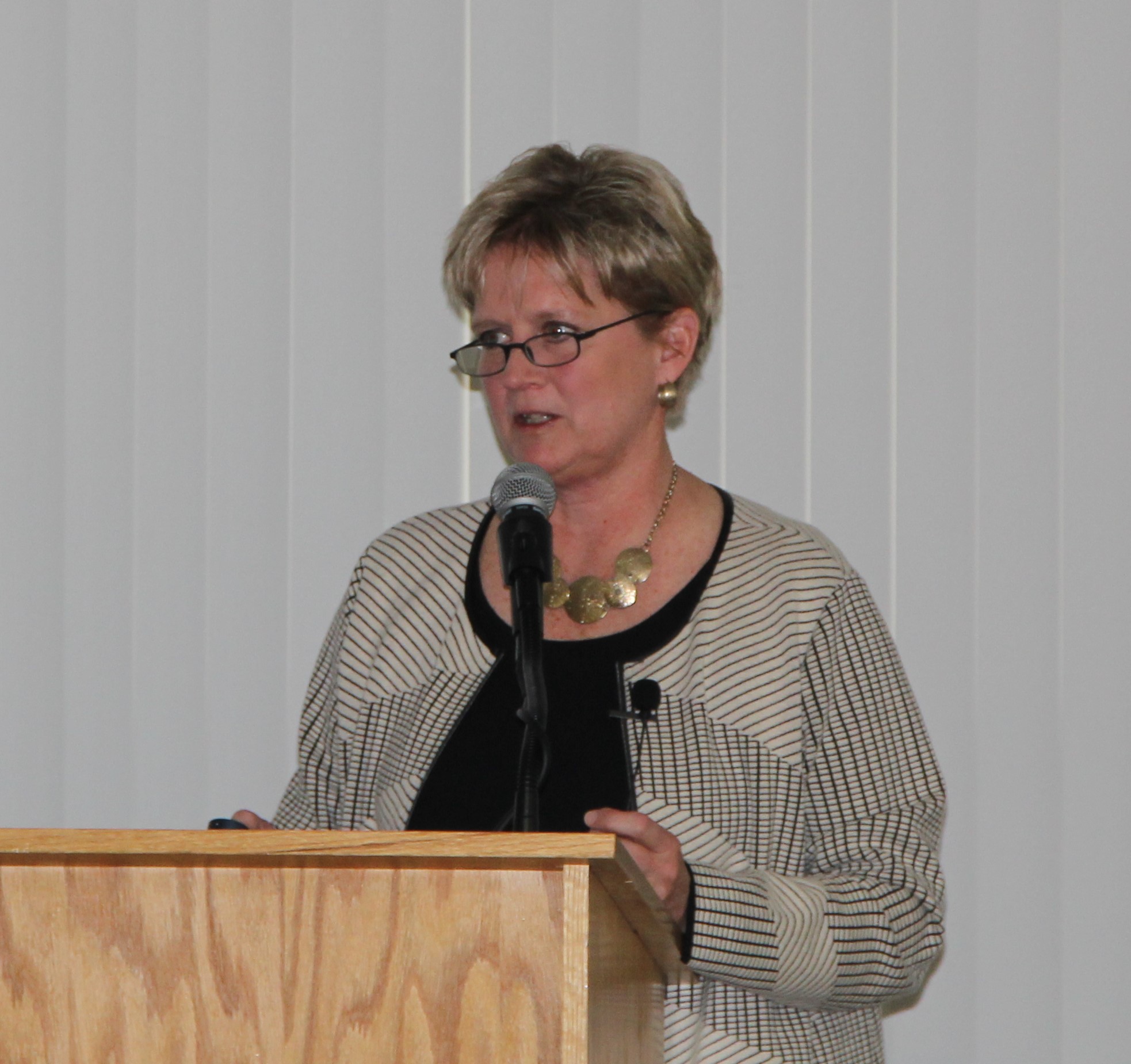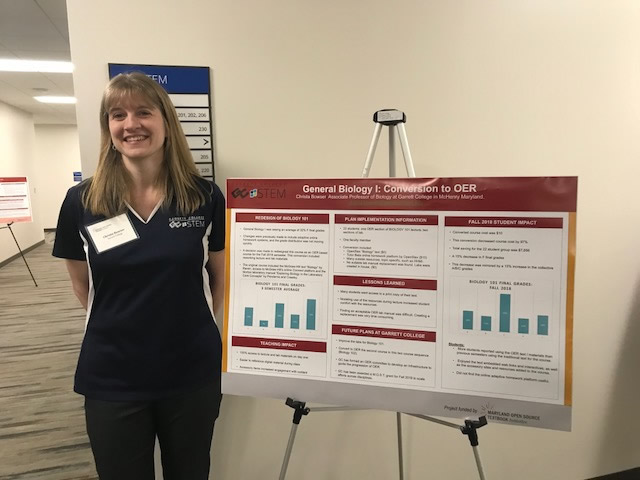Campus News
April 30, 2019
GC, ACM jointly host regional OER Forum
Kirwan Center's Bishop encourages forum attendees to 'Avoid the temptation to take a new tool and replicate what we've done in the past'
Dr. MJ Bishop challenged participants in Friday's Maryland Open Source Textbook (M.O.S.T.) Regional OER Forum to break from past educational tendencies.
"This is where the rubber hits the road," Bishop told conference attendees Friday morning at Garrett College. "I encourage you to avoid the temptation to take a new tool and simply replicate what we've done in the past."

Dr. MJ Bishop, plenary speaker at last Friday's Maryland Open Source Textbook Regional OER Forum at Garrett College, encouraged forum attendees to "Avoid the temptation to take a new tool and replicate what we've done in the past."
Twelve institutions of higher education participated in the forum, which centered on how Open Educational Resources (OERs) – online course materials that can eliminate or dramatically reduce textbook costs – can change the face of postsecondary education. The forum was supported by Maryland Online, the Maryland Association of Community Colleges, the University System of Maryland, and the Maryland Independent College and University Association. edBridge Partners, LLC, was also a forum sponsor.
GC and Allegany College of Maryland were co-hosts for the event – which, while focused on OERs, featured a broader discussion about the potential for positive change created by OERs. Bishop noted the forum was "the first of several regional forums that will take place across the state," adding "congratulations to Western Maryland for leading the charge for the state."
Bishop, associate vice chancellor of the University System of Maryland and director of the William E. Kirwan Center for Academic Innovation, observed how previous technological advances – including both radio and television – failed to revolutionize education because educational leaders viewed these technologies as updated strategies for doing business as usual. She said OERs need to be treated differently if they are to positively impact higher education.
"It's not really about OERs – it's about the ability of OERs to increase accessibility, affordability and student achievement," said Dr. Bishop, who came to the Kirwan Center in 2013 after serving as the teaching, learning and technology director for Lehigh University's College of Education.

Garrett College Associate Professor of Biology Christa Bowser stands with her poster display summarizing her conversion of General Biology I to Online Education Resources. Bowser also facilitated a STEM faculty roundtable discussion and co-presented at another session at the Maryland Open Source Textbook Regional OER Forum at GC.Pictured Cassidy Mark
"I thought Dr. Bishop's ability to focus on the larger issue of technology and the need for understanding those tools to be important," said Christa Bowser, an associate professor of biology who has been one of the institutional leaders in Garrett College's OER movement.
"She framed the OER topic in a larger picture and not as a trend," added Bowser, who facilitated a STEM faculty roundtable during the forum. "If people can see the 'why' to OER, they can fully appreciate the advantages it offers to students and to faculty."
Fred Stemple – GC's distance learning coordinator, who was one of the forum's main organizers and facilitator of an administrator group – said administrators used their roundtable event to discuss strategies for leveraging OERs to strengthen transfer pathways.
"We talked about how we could share and collaborate on OER work between the two- and four-year institutions," said Stemple. "One of the key strategies we discussed was building statewide shared platforms for an OER/M.O.S.T. for coursework, networking and collaboration space."
Garrett College President Dr. Richard Midcap, who introduced Bishop, also emphasized the need to use OERs as a mechanism for change.
"Most people understand how OER's can save students money, which can also increase educational access to those for whom textbook costs may be a significant barrier," said Midcap, who started a conversion to OER's while chief academic officer at Chesapeake College before accepting the GC presidency in 2016. "I'm not sure everyone understands the potential for OER's to improve both quality and currency of course materials. The OER movement is more about improving educational opportunities than about saving textbook costs – although reducing the cost of postsecondary education remains key to improving educational access."
Midcap noted that GC has been "an early adopter" in the OER movement, thanks both to the passion of GC faculty and the availability of M.O.S.T. grants to help fund the adoptions. He also observed that GC is developing grant applicants to build out the College's OER initiative, including an Appalachian Regional Commission (ARC) grant application that would dramatically expand GC's OER platform.
"I'm committed, as is our faculty, to being a leader in OER development," said Midcap. "All available data points to OER's as critical to improving accessibility, affordability, and academic achievement – and those three pillars should drive all that we do at Garrett College."
Midcap lauded the GC faculty for their commitment to the OER initiative. He noted that Stemple, Bowser, Associate Dean of Academic Affairs Lucy Manley, and Assistant Professor of English Anna James all facilitated conference roundtables.
Manley said the discussions among the social sciences, business and education faculty representatives were both thoughtful and nuanced.
"They expressed concerns of a binary conversation – OER faculty/classes versus non-OER faculty/classes – but they're excited to add OER as a tool in their pedagogical toolboxes," said Manley. "The faculty engaged in a rich conversation about the need for more research about the benefits of OER, outside of reduced cost, which was also emphasized in Dr. Bishop's plenary."
Bowser and Frostburg State University Library Director Lea Messman-Mandicott co-presented a concurrent session on Finding, Adopting and Adapting High-Quality OER.
"The time investment cannot be stated loudly enough," observed Bowser. "This conversion of materials goes far above the normal updating of current events faculty do with their classes. Institutionally, each school needs to have processes and in-house ways of managing the forward movement of courses going to OER. And this investment in time is beyond just faculty."
"Challenges exist to providing faculty with the time and resources they need to implement OERs into their courses," agreed Stemple. "Sustainability is then the challenge – working to keep content current, and maintaining the quality and transferability of OERs within course disciplines and among faculty in the future."
Manley said forum participants were pleased with the opportunities the forum provided for both regional and two- and four-year collaboration.
"A valuable aspect of the M.O.S.T. regional summit is that it provided a space for community colleges to collaborate with four-year schools so both institutions have a better understanding of their audience," said Manley. "In all sessions I attended, there was a constant buzz about the importance of continuing conversation and collaboration among the Western Maryland higher education institutions."






